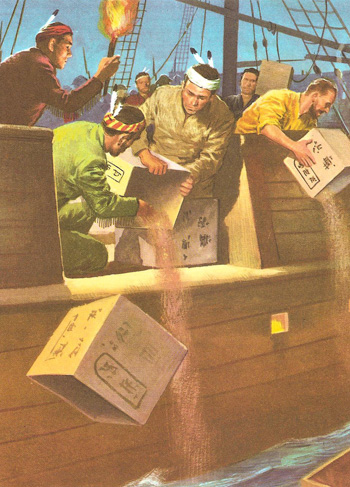Boston Tea Party

Colonists, disguised as Mohawks, throw into the sea several tons of tea. Some of the leaves were washed up on the shore. These have been preserved and can be seen today in the Boston Museum.
The Boston Tea Party was an incident which occurred on December 16, 1773, on board some tea-ships in Boston Harbor. High taxation imposed by the British Parliament under George III had caused bitter feelings and, instigated by popular meetings, a party of citizens, disguised as Indians, boarded the tea-ships and threw the tea overboard. This incident was a prelude to the American War of Independence (1775–1783).
Thirteen colonies
In 1763 there were in America thirteen quite separate British colonies. They were in no way united and were inclined to be rather jealous of each other. This was hardly surprising, considering their different backgrounds; for example. Maryland had been originally founded for Roman Catholics, Pennsylvania for Quakers, and Georgia for discharged bankrupts. In 1763 they were all on good terms with Britain. Together they fought a long war against the French and driven them out of Canada. Glorious feats of arms had been performed at Quebec and other places, and a spirit of comradeship between Britain and America had been created by the great statesman William Pitt.
A heavy debt
Unfortunately this situation was not to last. As a result of the war Britain's National Debt had been increased by £70,000,000. Moreover, it still cost Britain£420,000 a year to administer the colonies and protect them from Indians; taxes raised in the colonies amounted to about £16,000. To statesmen in Britain it seemed reasonable that the colonists should pay more. But how was this money to be raised?
Taxation
Britain had always had the right to impose customs duties, but these did not raise much revenue. And so the British Chancellor of the Exchequer, George Grenville, consulted the Americans about some suitable tax, but when no suggestions were forthcoming he introduced the stamp tax. By this it would be necessary for all documents, licenses, newspapers and other things to bear a stamp which might cost anything from 1d. to £6.
This caused an uproar; there had never been a tax like this before. Americans declared they would rather die than pay it and raised the cry of 'No taxation without representation'. By this they meant that the only body who could tax them was the parliament which they themselves had elected. They believed that all freedom depended on this and recalled how at the time of Charles I such men as Eliot and Hampden had gone to prison for the sake of this principle.
To the statesmen back in England this outcry came as a surprise. They could not understand why Americans should be prepared to pay customs duties but object violently to paying stamp tax. However, later in 1765 a new government came into office, the leaders of which were sympathetic to the colonists, and the Stamp Tax was abolished. In America there was great rejoicings at this triumph, but the story was not yet finished. In 1767 yet another government came into office, and the question of taxing America once again arose, This time it was decided not to do it by direct taxation but by new import duties, Accordingly taxes were imposed on glass, paint, paper, and tea.
If the British statesmen had thought that these taxes would be accepted quietly by the Americans, they were soon proved wrong. Once again there was an uproar, and a boycott of British goods was organized, so that in 1769 imports from Britain fell from £482,000 to £74,000.
Once again the British government gave in. The Prime Minister, Lord North, would willingly have abolished all the duties, but King George III insisted that one be kept so as to maintain Britain's right to tax if she wanted to. And so the duty on tea remained, For a time it seemed as if this solution suited most people, and tempers died down, but trouble still lay ahead.
The tea-party
There were in England at that time huge stocks of tea belonging to the East India Company. In order to help this company, which was nearly bankrupt, Lord North gave it permission to export this tea free of duty to America. Although this had the effect of reducing the price of tea, it also threatened to put out of business all American tea merchants. These people now proceeded to stir up trouble.
When the first tea ship, the Dartmouth, entered Boston harbor there was a great outcry, and on the night of December 16th, 1773 a party of young men, who had been drinking somewhat, disguised themselves as Mohawk Indians, boarded the Dartmouth and threw all the tea into the sea, defying King George III to interrupt their 'tea-party'.
Consequences
The consequences of this act were tragic. Suddenly the British government lost patience, Urged on by George III, they took very stern measures: the port of Boston was closed and the state of Massachusetts was put under martial law. However, far from quelling the Americans, this merely made them angry and resentful. For the first time all thirteen colonies joined together, and within two years the American War of Independence had broken out.
